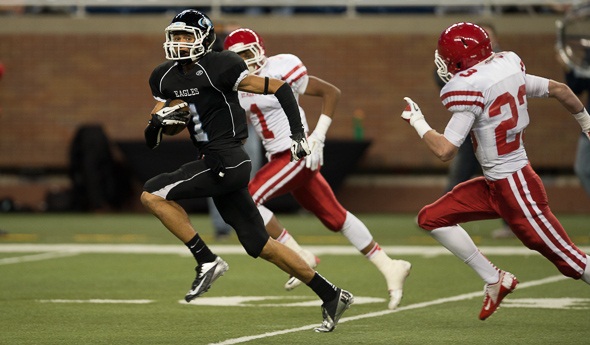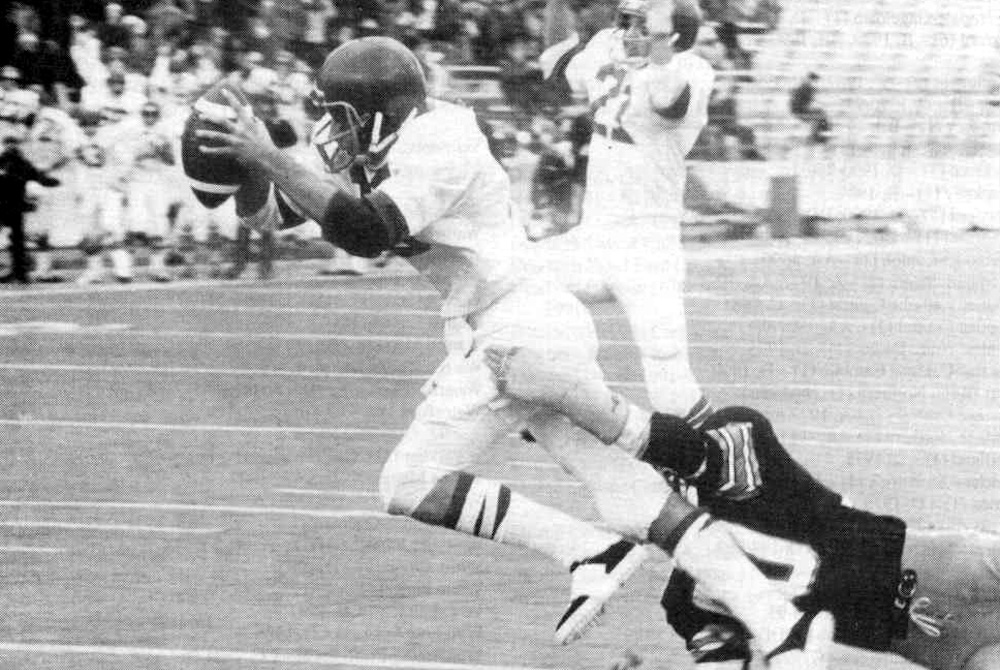
Harris Soars, Eagles Fly to D3 Championship
November 24, 2012
By Bill Khan
Special to Second Half
DETROIT — A funny thing happened on Drake Harris’ way to hoops stardom.
He discovered he’s even greater on the gridiron.
The junior wide receiver didn’t intend to play high school football at Grand Rapids Christian, but now figures that’s his meal ticket in college — and perhaps beyond — after a record-breaking season that culminated with an epic performance in the MHSAA Division 3 championship game against Orchard Lake St. Mary’s.
Harris made three clutch catches in the final eight minutes to keep scoring drives alive and finished with a MHSAA Finals record of 243 yards on eight catches in the Eagles’ 40-37 overtime victory Saturday night at Ford Field.
Twice on the game-tying drive, Harris made leaping catches on fourth down. His 7-yarder on fourth-and-three and 15-yarder on fourth-and-eight set up a 28-yard field goal by Joel Schipper with four seconds left in the fourth quarter.
After the Eagles stopped St. Mary’s on fourth-and-three on the first series of overtime, Schipper came out on first down and kicked the championship-clinching 27-yard field goal.
In the process, Harris became only the 12th player nationally and first from Michigan to rack up 2,000 receiving yards for one season. He finished the season with 2,016.
“It’s a great achievement for me,” Harris said. “I have to thank the quarterback, the line and my coaching staff for putting me in the right position to make plays. All I care about is that state championship.”
It's the first for Grand Rapids Christian, which also made its first MHSAA Final appearance and finished this fall 13-1. St. Mary's, last season's Division 3 champion, ended 11-3.
Harris had hoop dreams coming into high school, figuring he would specialize in basketball to enhance his college opportunities. After getting talked into playing football by Eagles coach Don Fellows, Harris discovered a hidden talent. He wound up making a verbal commitment last summer to Michigan State to play both sports, but football may eventually win out.
“I never realized the talent I had for football,” the 6-foot-4, 180-pound Harris said. “I’m putting it all together. I’m going to keep working hard to achieve my goals.
“(MSU basketball coach Tom Izzo) loves players that play football. He told me that. He encouraged me. He’s with me with the whole situation and loves that I play football. I’m kind of starting to lean more towards football. I just feel like I’m probably better in football and that I can go further in football.”
 Grand Rapids Christian quarterback Alex VanDeVusse was 16 for 26 for 307 yards and a touchdown, but deflected any credit for his performance to his outstanding wide receiver. VanDeVusse noted that a couple of Harris’ catches late in the game came on passes that would’ve eluded the grasp of most high school receivers.
Grand Rapids Christian quarterback Alex VanDeVusse was 16 for 26 for 307 yards and a touchdown, but deflected any credit for his performance to his outstanding wide receiver. VanDeVusse noted that a couple of Harris’ catches late in the game came on passes that would’ve eluded the grasp of most high school receivers.
“He makes me look really, really good,” VanDeVusse said. “Balls that are behind him, he slows down and catches it with one hand if he has to. Balls that are too high, he jumps and gets flipped. People don’t necessarily think he’s tough or something, but to have a guy go three or four feet in the air to get flipped, catch the ball and land on his back and his head, he’s pretty tough in my book. I’ll take him on my team every single day. He’s amazing.”
VanDeVusse looked to Harris in every clutch situation, of which there were several in a wild fourth quarter.
“We joke around that he’s our toy,” VanDeVusse said. “If you have a toy, you’re going to want to play with it all the time. We use him a lot and he does every bit that we ask of him.”
The Eaglets knew that Harris would be targeted when Grand Rapids Christian needed a big play, but even double coverage couldn’t stop him.
“He makes you shift,” St. Mary’s coach George Porritt said. “You have to bring more people to him. You can’t guard him with one. It might leave somebody else open. He forces you to bring two, maybe three.”
A 42-yard run by VanDeVusse gave Grand Rapids Christian a 20-7 lead with 4:42 left in the first half, but St. Mary’s rallied behind a ground game that rolled up 459 yards to take its first lead at 30-27 with 9:37 left in the fourth quarter.
Harris made a 38-yard catch on third-and-27 with 8:00 remaining, one play before a 32-yard touchdown run by Seth McIntosh put the Eagles ahead 34-30 with 7:45 to go.
St. Mary’s then marched 80 yards in 12 plays to grab a 37-34 lead with 2:06 left on a 3-yard run by Grant Niemiec.
Harris made four catches for 47 yards on the ensuing drive, which culminated in Schipper’s game-tying field goal.
St. Mary’s got the ball first in overtime. A pass by Matt Linehan intended for running back Parker McInnis in the end zone fell incomplete on fourth-and-three.
Grand Rapids Christian didn’t hesitate to bring in Schipper to end the game with his right foot on first down.
“I knew it was a big kick starting off, but I just tried to block it all out,” Schipper said. “It felt just like at practice. Coach puts a lot of pressure on us during the week so these situations don’t come as big in the games. That really helped me. I’m just glad I could get the win for the team tonight.
“He’s got the whole team screaming in my ear in practice when I’m trying to make field goals. That really helps in this environment.”
St. Mary’s lost, despite setting a finals record with 579 yards of total offense. The teams combined for a record 1,033 yards.
McInnis ran 25 times for 269 yards, while Niemiec carried 28 times for 168 yards and three touchdowns for St. Mary’s.
Click for full statistics and to watch a replay of the game.
PHOTOS: (Top) Grand Rapids Christian receiver Drake Harris runs away from two Orchard Lake St. Mary's defenders for some of his record-breaking yardage Saturday. (Middle) The Eagles celebrate their first MHSAA championship. (Click for more from Terry McNamara Photography.)

1975 Ishpeming Title Made National News, Set Standard for Success to Come
By
Jason Juno
Special for MHSAA.com
November 22, 2024
ISHPEMING — Before the 1975 season started, Ishpeming football players talked about the possibility of playing Hudson for a Class C championship.
That was no easy task with just four teams in each Class making the playoffs during the first year the MHSAA sponsored a football tournament.
“We just said to ourselves, ‘Wouldn’t it be something if we played them in the state championship game?’” said Mark Marana, Ishpeming’s all-state quarterback.
When that dream came true, the Hematites felt confident they could defeat Hudson, Marana said, no matter how improbable it appeared.
Hudson entered the 1975 Class C championship game on a 72-game winning streak. The Tigers had been featured in Sports Illustrated, and they were highlighted on TV before a Sunday of NFL games. Everyone knew about Hudson.
When Ishpeming beat the Tigers, the New York Times published a wire story about it.
The Hematites stunned everyone but themselves with that 38-22 victory to become the first Class C champions in Michigan.
“It was one of the greatest things I’ve been a part of in my lifetime,” Marana said.
He said they’re still celebrating the title, and he’s 67 years old.
“It was really a highlight in our community, naturally,” Marana said. “When you’re a Yooper, I think we had the whole U.P. going for us to win the game and the state championship. It was great; we were an underdog going in. They were a good team, but we were also good ourselves.”
The Hematites played bigger schools throughout most of their schedule, including undefeated Class A Marquette, which likely helped them clinch one of the four playoff spots.
“We had some talent,” Marana said. “We had a great tailback in Mike Dellangelo (5-foot-6, 160 pounds). We were doing some things offensively that people weren’t doing at the time. We were running the option game out of the I formation. We had multiple formations, which a lot of teams didn’t do at that time.”
Ishpeming jumped Hudson early. Bill Andriacchi blocked a punt to set up the first score of the game, and Ishpeming led 24-8 after the first quarter.
Hematites’ coach Mike Mileski emphasized the importance of that play to the Green Bay Press-Gazette.
“We had three guys scout Hudson in their Semifinal, and one of the things we thought we could do was block their punts,” he said. “We had four different rushes planned, and we just called the right one in that case. It was our game after that.”
“There was pressure on those guys,” Marana said. “That was one thing that was real critical is that we jumped out to a great start.”
Dellangelo rushed for 158 yards on 21 carries and scored two touchdowns in the championship game played at Central Michigan University.
He scored his first touchdown on a 60-yard run; with Marana’s 2-point run, it gave Ishpeming the 24-8 lead going into the second quarter. Dellangelo’s other TD, a 10-yard rush in the third quarter, gave the Hematites a 36-16 advantage.
“Mike Dellangelo was a great, great tailback,” Marana said. “He had great speed, he was an extremely tough kid and he could pick them up and lay them down.”
Marana said the Hematites were well-coached by Mileski. He said he was lucky enough to get the all-state recognition from the Detroit Free Press, but he said he couldn’t have done it without his teammates.
“It happened at the right time, first year of the playoffs. It worked out you’re playing a team that’s got 72 straight wins,” he said. “I’m going to tell you, they were extremely well-coached and they were a very good football team, also.”
Marana said Ishpeming was a close group that grew up together.
“Great coach, great team, great teammates, guys that were dedicated,” Marana said. “We were very close. Actually, when you have a good team, most of the time you’re pretty close to one another.”
They continue to stay in touch. When Marana was inducted into the U.P. Sports Hall of Fame this spring, 18 of his teammates were at the ceremony. There were only 25-26 players on the team.
“We’re very tight, very tight to this day,” he said.
It was the first of seven championship game appearances for Ishpeming, which has won five Finals titles.
It all started with the 1975 team.
PHOTO: Ishpeming's Mark Marana works to break away from a tackler during the 1975 Class C Final. (MHSAA file photo).

